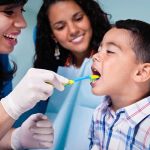Taking Care of Your Oral Health After Tooth Loss
As someone who has experienced the emotional and physical toll of losing a tooth, I understand how overwhelming it can be to think about the future of your oral health. Whether the tooth loss was due to an accident, gum disease, or a natural process, the aftermath requires careful attention. In my own journey, I've learned how essential it is to protect my remaining teeth and gums after a tooth loss. In this article, I’ll share practical tips and strategies that have helped me protect my oral health after losing a tooth and that can help you too.
Why Oral Health Care Matters After Tooth Loss
When you lose a tooth, it’s easy to assume that the biggest challenge is simply coping with the gap left behind. However, the truth is that tooth loss can have a cascading effect on your overall oral health. Without that tooth, the surrounding teeth are at risk of shifting out of place. In addition, the underlying bone structure can begin to weaken and deteriorate over time, which can cause more problems down the road.
After my tooth loss, I was surprised to learn that taking immediate action to protect my remaining teeth could prevent further complications. Ensuring that the remaining teeth stay in proper alignment and that the gums remain healthy is crucial for long-term oral health.
1. Keep the Gums Healthy and Clean
After losing a tooth, one of the first things I focused on was keeping my gums clean and healthy. The site of the lost tooth can become vulnerable to infections if not properly cared for. I followed my dentist's advice on maintaining proper gum hygiene, which included brushing gently around the area and using an antiseptic mouthwash. This not only helped keep the area free from infection but also minimized the risk of further gum disease.
It’s important to remember that your gums play a crucial role in holding your teeth in place. If your gums are weak or inflamed, this can contribute to additional tooth loss, even in the remaining teeth. I found that using a soft-bristled toothbrush and gently brushing the gums, especially around the site of the missing tooth, helped avoid irritation while keeping my oral environment healthy.
2. Consider Replacement Options: Implants, Bridges, or Dentures
After my tooth loss, I realized that leaving a gap for too long could lead to misalignment or bite problems. The longer you wait to replace a missing tooth, the more likely it is that your other teeth will shift. For me, deciding on the best tooth replacement option was an important part of maintaining my oral health. I had to choose between dental implants, bridges, and dentures, depending on the size and location of the tooth loss.
- Dental Implants: For me, dental implants were a game-changer. An implant involves surgically placing a post in the jawbone, which then supports a crown. It’s a durable and long-term solution that mimics the natural tooth in both function and appearance.
- Bridges: A bridge is another great option if you’re not ready for an implant. It bridges the gap between two healthy teeth, replacing the missing one. I found it to be a good temporary solution before I could afford an implant.
- Dentures: If you’ve lost multiple teeth, dentures might be a suitable choice. Dentures are removable devices that replace missing teeth, and while they may not feel as natural as implants, they provide a functional solution to tooth loss.
3. Use a Night Guard to Prevent Shifting Teeth
After losing a tooth, one of my biggest concerns was the possibility of my other teeth shifting or becoming crooked. This happens because the remaining teeth no longer have the support of the missing tooth, which can cause them to lean toward the gap. To avoid this, my dentist recommended using a night guard, especially since I tend to grind my teeth at night.
A night guard is a protective device that fits over your teeth and helps prevent them from moving or grinding against each other while you sleep. It not only protects your remaining teeth but also helps prevent jaw pain, which can often arise after tooth loss. Wearing a night guard has been one of the most effective ways to protect my oral health post-tooth loss, and I highly recommend it if you're concerned about shifting teeth.
4. Pay Attention to Your Diet
Your diet plays a major role in your oral health, especially after losing a tooth. I quickly realized that soft foods, like mashed potatoes and yogurt, were essential in the early days following my tooth loss, as they put less strain on my gums. However, as time passed, I made sure to incorporate more foods that support dental health, such as crunchy fruits and vegetables, lean proteins, and dairy products rich in calcium.
Calcium is especially important for maintaining the health of your teeth and jawbone. After tooth loss, the bone where the tooth once sat can start to deteriorate. By consuming enough calcium and vitamin D, I worked to keep my jawbone strong and healthy, which helped improve the chances of successful implants if I chose to go that route.
5. Regular Check-ups with Your Dentist
One of the best pieces of advice I received after my tooth loss was to keep up with regular dental check-ups. These visits are crucial for monitoring the health of your gums, jawbone, and remaining teeth. During my appointments, my dentist could assess any changes in my mouth, identify early signs of infection, and recommend treatments if needed.
In my case, these regular visits allowed my dentist to spot potential problems, like gum recession or bone loss, early on. The sooner these issues are caught, the easier they are to treat, and having a professional monitor my oral health gave me peace of mind throughout the recovery process.
Final Thoughts on Protecting Your Oral Health After Tooth Loss
Tooth loss doesn’t have to lead to further oral health problems if you take the right steps to protect your remaining teeth and gums. By focusing on maintaining clean and healthy gums, considering replacement options, using night guards, paying attention to your diet, and attending regular dental check-ups, you can prevent many complications associated with tooth loss.
If you're experiencing tooth loss and want to learn more about your options, I recommend visiting our website【Dentistry Toothtruth】for the most reliable and up-to-date information on how to manage your oral health and restore your smile.







 D3 Dental of Horsham4.0 (342 review)
D3 Dental of Horsham4.0 (342 review) Don C. Kalant Sr. DDS, FACD, FICD3.0 (32 review)
Don C. Kalant Sr. DDS, FACD, FICD3.0 (32 review) All Family Dental and Braces4.0 (689 review)
All Family Dental and Braces4.0 (689 review) Oral Surgery Hawaii4.0 (385 review)
Oral Surgery Hawaii4.0 (385 review) Spencer Dental & Braces4.0 (459 review)
Spencer Dental & Braces4.0 (459 review) Midwest Dental - Eagan4.0 (150 review)
Midwest Dental - Eagan4.0 (150 review) The Importance of Oral Health Education During Pregnancy for a Healthy Pregnancy
The Importance of Oral Health Education During Pregnancy for a Healthy Pregnancy Best Tips for Brushing Your Teeth Properly for Healthy Gums: Essential Techniques for Oral Health
Best Tips for Brushing Your Teeth Properly for Healthy Gums: Essential Techniques for Oral Health Why Skipping Dental Checkups Can Lead to Bigger Oral Health Problems
Why Skipping Dental Checkups Can Lead to Bigger Oral Health Problems Advantages of Porcelain Dental Restorations
Advantages of Porcelain Dental Restorations How Can Diabetes Cause Tooth and Gum Problems? Preventing and Managing Oral Health Issues
How Can Diabetes Cause Tooth and Gum Problems? Preventing and Managing Oral Health Issues Healthy Habits for Promoting Good Oral Health and Hygiene: Tips for a Healthy Smile
Healthy Habits for Promoting Good Oral Health and Hygiene: Tips for a Healthy Smile